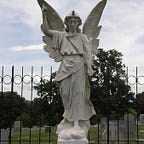The Murder of Nell Cropsey
Episode 7: Jim Wilcox — Guilty or Not?
Once James Wilcox was packed off to Central Prison in 1903, speculation as to his guilt did not stop. A letter was published in New York newspapers mailed in Utica on Jan. 27th that supposedly named who really killed Nell Cropsey and stated categorically that it was not Wilcox. The letter was reported in the News and Observer on Feb. 4th. “The dog led her to a poplar tree or high shrubbery, and there she saw a man whom she recognized…and he struck her with a stick which he held in his hand.” The article goes on to say, “He left the Cropsey residence on the fatal night twenty minutes after Wilcox…”. Though he is not named in the article, it is clear that the writer believes that man was Roy Crawford.
The defense took the case to the Supreme Court again in May on the basis that the “evidence is not of such a character as would justify the finding of the verdict in this case beyond a reasonable doubt against the Defendant.” (The North Carolinian, May 28, 1903) but the higher court found no error in the trial.
In November 1904 the first attempt to obtain a pardon was undertaken. When Andrew G. Cropsey, an attorney in New York and uncle of Nell Cropsey heard of the effort, he was enraged, “Now Jim Wilcox’s friends are working hard to get him pardoned. I will appeal to Mr. Glenn’s sense of right and justice, and if necessary we will get up a petition containing thousands of names of people living in the vicinity of Elizabeth City, protesting against the release of Wilcox from prison. If he serves one day less than thirty years there is no sense of justice” (The Morning Post, December 15, 1904).
Despite local sentiment, the defense did not stop trying to obtain a pardon for Wilcox. The attempts were not successful with Glenn and Craig, but they continued to apply until 1918 when such was made to Governor Thomas Bickett, who had denied the pardon the previous year. Bickett stated to the News and Observer that he had many letters supporting the release but what finally swayed his opinion was a letter from the prisoner himself. In it Wilcox said, “…were it my last words on this earth, I would still protest my innocence and would not be going before my Maker with a lie on my lips…I come and ask you for mercy, and should you see fit to grant me a pardon, I can assure you I will not cause you one regret for having done so.” Prison officials sent letters to the governor as well, citing the exemplary nature of the prisoner’s behavior for the fifteen years he had been imprisoned and asking for mercy on his behalf. Elsewhere in the same edition an opinion piece commented on the mystery surrounding the case and “as Wilcox has pursued a policy of silence during the nearly sixteen years in prison it is unlikely that he will clear up the mystery now that he has been made a free man” (December 21, 1918). On December 20, 1918, James Wilcox was granted a pardon and released from prison. Within days, he had returned to Elizabeth City, where, except for his loyal friends and family, he did not receive a hero’s welcome.
~by Debbi Blake
stay tuned for the final installment — Episode 8: The Weirdness that Followed
Previous installment, Episode 6: Off to the Supreme Court
